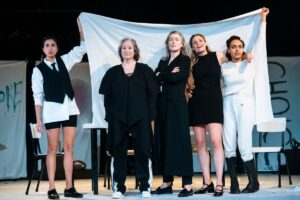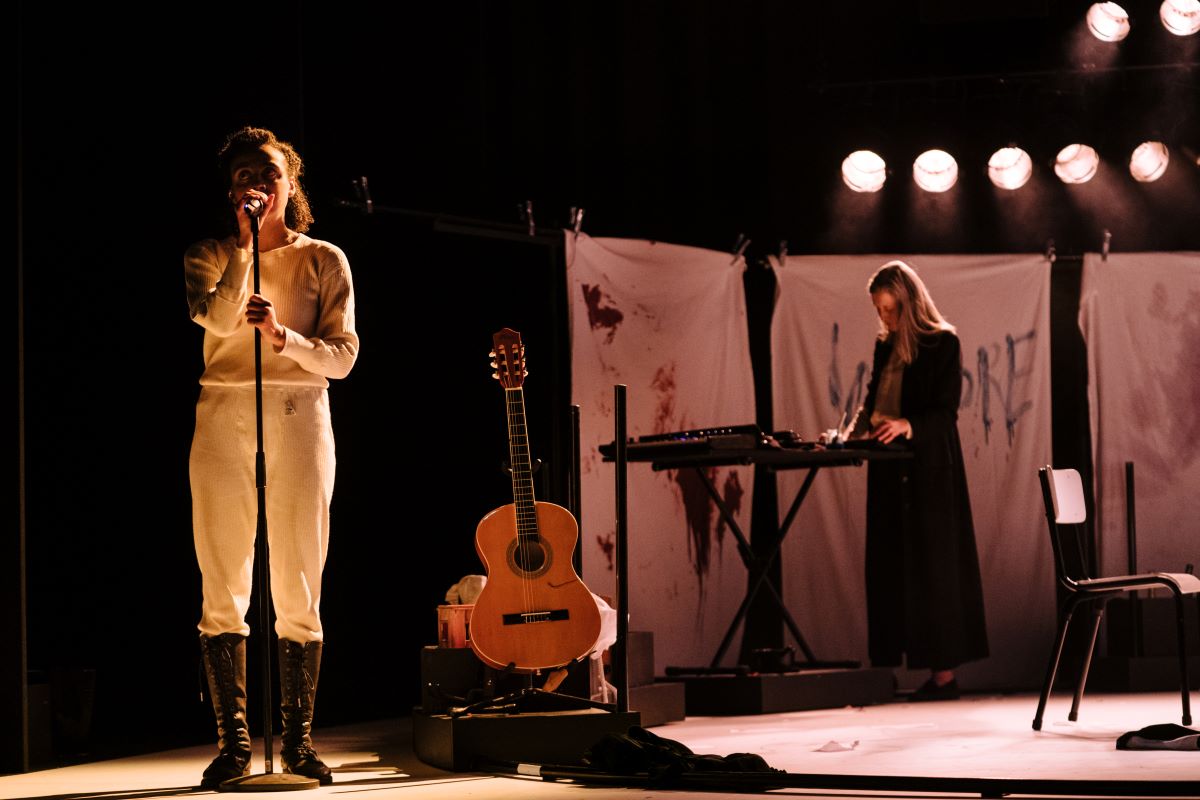A woman’s body is not an easy thing to live in. This is the point made with luminous force and poetic beauty in director Eline Arbo’s theatrical adaptation of The Years, currently running at the Harold Pinter Theatre, whose cavernous auditorium is well-suited to the epic ambition and chronological scale of this production. Taken from Nobel Prize-winning author Annie Ernaux’s deeply personal novel, the swift two hours’ traffic of the stage charts decades of twentieth-century life in France from the perspective of a female writer.
Consonant with Ernaux’s apprehension of the multiplicity of the self – an idea popularised by modernists from Woolf to Whitman – a quintet of actresses share the central role. They are sharply distinguished by their voices, ages, backgrounds and physicalities. Such discontinuity in casting is highly effective, conveying the wildly diverse selves a person is across a lifetime, while simultaneously representing a communality of female experience, a point reinforced by the continual use of the pronoun ‘we’ in lieu of ‘I’.
Harmony Rose-Bremner is the portrait of the writer as a young girl in the 1940s, bursting with vitality and impatiently hungry for adulthood. Anjli Mohindra triumphantly plays the teenage years rapt by the discovery of sex, the consequences of which are realised in Romola Garai’s devastating portrayal of an illegal abortion during university days. Gina McKee brings warmth to a decade of middle age, where love is lost and found, whilst Deborah Findlay’s transition into later life in a new millennium exudes inner peace and wisdom.
As The Years runs this broad sweep of time, it effectively interleaves fragments of personal and political history; post-war life, the student protests of 1968 and the birth of the contraceptive pill are seen alongside marital disillusion, career change and menopause. Yet Arbo finds shape by dividing the play into episodes which are brought to life through reference to photographic portraits, each one defining a particular decade. Every actress takes it in turn to pose in front of a white sheet held up as if to form a screen in a photographer’s studio. Their varying gaits and expressions hold so much life. Pain and joy, we are reminded, leave traces on the body.

Music, too, is used to navigate the play’s chronological expanse. Astute choices from sound designer Thijs Van Vuure summon whole zeitgeists. Jefferson Airplane’s White Rabbit pulls the audience into the drug-induced headiness of the sixties, and Taylor Dayne’s Tell It To My Heart revives eighties dance culture with its punchy optimism. Frequently, however, it is left to Rose-Bremmer to perform the backing tracks to the scenes, displaying her entrancing musical talent and raising the emotional stakes of the production through the power of live vocals.
The Years is a production that demands a visceral response from its audience (the trigger warnings aren’t for nothing). On the night I attended, the performance was halted twice due to audience members fainting at the bloody abortion episode and subsequent uncompromising depictions of motherhood. These scenes were distressing; but it’s also worth remembering they are realities endured, with great strength and silence, by half the population. If such events shock, it reveals the extent to which female experience is still sanitised on stage and off. As such, Eline Arbo’s production felt like a watershed moment, a violent jolt to the heart. Bring your mothers, daughters and sisters. Or better, bring your boyfriend. This is theatre at its most revelatory, where female interiority, in all its rousing complexity, is the drama.
The Years
Based on Les Années by Annie Ernaux
Adapted and Directed by Eline Arbo
English Adaptation by Stephanie Bain
Photo credits: Helen Murray
Cast includes: Deborah Findlay; Romola Garai; Gina McKee; Anjli Mohindra; Harmony Rose-Bremner.
Until: Saturday 19th April 2025
Running Time: 2 hours with no interval

